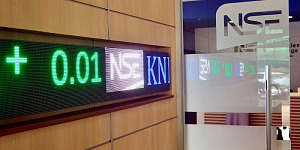Investor wealth at the Nairobi Securities Exchange (NSE) dipped by Sh1 billion during the first trading day of the New Year Monday, data showed, halting two weeks of gains.
The combined investor wealth at the bourse closed at Sh2.335 trillion amid a recovery in trading activities. This is in contrast with Sh2.336 trillion on the last day of trading for 2020.
The shilling on the other hand remained unchanged at 109.2 units to the dollar, displaying the relative stability it has from mid-December.
The local currency had a tumultuous run last year, hitting an all-time low of 111.59 on December 17 before making some recovery in the second half of last month.
The number of shares traded on the NSE jumped by 117 percent to 8.675 million when compared to four million last Thursday, showing the return of investors after Christmas and New Year celebrations.
The value of equity turnover increased 2.8 times to Sh242.14 million from Sh86.1 million registered on the last day of trading last year.
The Safaricom stock remained unchanged at Sh34.25 per share as Equity and East African Breweries shed Sh0.30 and Sh0.25 respectively.
However, KCB and Co-operative Bank shares posted gains of Sh0.30 and Sh0.05.
Safaricom was the day’s biggest mover with 3.5 million shares valued at Sh122 million or 50.77 percent of the day’s traded value changing hands.
Eyes will be on whether NSE will turn the corner on the Covid-19 disruptions that saw the combined investor’s wealth shrink by Sh203.7 billion last year.
Total market value as measured by market capitalisation declined to below the Sh2 trillion mark when the pandemic hit Kenya, but recovered slightly to close the year at Sh2.336 trillion.
NSE chairman Kiprono Kittony said that NSE expects the recovery to continue this year hinged on the return of foreign investors, improved business environment and the attractive prices of many stocks.
"We expect increased foreign investor flows because of the recent upgrade on the Morgan Stanley Capital International (MSCI) emerging markets index which gives Kenya increased allocation due to higher weighting," said Mr Kittony.
The MSCI, the world’s largest market index provider, in November started phased reclassification of the Kuwait stock market — which currently accounts for more than a quarter of frontier markets index — in a year-long process through five stages.
This shift means that Kenya’s weight in the index will increase to 9.49 percent from about 8.2 percent after Kuwait fully exits.
Foreign investors account for about 70 percent of NSE trading activities and their interest in large capitalisation stocks has traditionally seen their activities dictate the direction of the market.
The NSE will become the fourth most important frontier market in the global listing after the biggest gainer Vietnam (28.76 percent), Romania (12.47 percent) and Morocco (10.26 percent).
Foreign investors last year withdrew a record Sh29.01 billion from the NSE in contrast with Sh1.378 billion added the previous year as they dumped equities in a Covid-19 environment.
All the three indices—NSE 20, NSE 25 and NSE all share—were down 30.2 percent, 17.4 percent and 9.3 percent respectively.
Only nine out of the 62 NSE stocks posted share price gains last year, with the only large stock being Safaricom which touched all-time high of 34.25.
Other gainers were Carbacid, Eeegads, Eveready, Kakuzi, Kenya Airways, Nairobi Business Ventures, Sasini and NewGold exchange-traded fund (ETF).
The NewGold ETF opened trading at Sh1,975, being a 34 percent gain since January last year .

















 FR
FR 






































